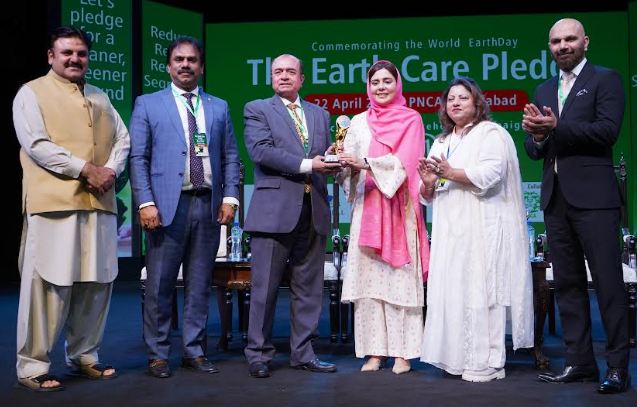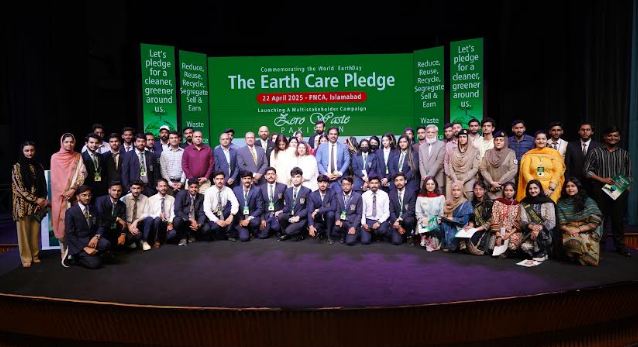ISLAMABAD, APR 22: /DNA/ – Experts from diverse sectors, educationists and students pledge to uphold the principles of environmental justice, equity, and sustainability in our daily lives and corporate operations, and promise to support and engage in efforts that promote climate resilience, nature conservation, responsible consumption, and environmental education. Their commitment includes to comply with national and international environmental laws, and support actions that align with the Sustainable Development Goals (SDGs).

The pledge also included recognition of indigenous knowledge and local communities’ role in environmental stewardship and pledge to support their participation and leadership in Earth care initiatives. The participants also committed to adopting the Zero Waste philosophy — to redesign our resource life cycles so that all products are reused, and no trash is sent to landfills, incinerators, or the ocean, and to refuse what they don’t need, and reduce what they do need, reuse or recycle what is consumed.
The Earth Care Pledge for a Zero Waste Pakistan was organized by the Development Communications Network (Devcom-Pakistan) to mark the World Earth Day on Tuesday at the Pakistan National Council of the Arts (PNCA) with the support of Health Safety Environment and Quality Department of Oil & Gas Development Company and Capital Smart City.
Speaking at the national launch of the Zero Waste Pakistan campaign under the Earth Care Pledge to commemorate Earth Day, Syeda Amna Batool, the Focal Person for the Prime Minister’s Youth Programme, emphasized the critical role of youth in driving sustainable development and environmental stewardship. She lauded the initiative as a timely and much-needed step towards promoting waste reduction, responsible consumption, and environmental awareness at the grassroots level. Highlighting the Zero Waste Pakistan campaign as a national call to action, she urged young people to take ownership of climate and environmental challenges and become champions of a cleaner, greener Pakistan.
Devcom-Pakistan founder and Executive Director Devcom-Pakistan Munir Ahmed said “With over 140 million young people in the country, we have the largest human capital in our history. If engaged meaningfully, youth can transform Pakistan’s waste crisis into a circular economy opportunity. The Earth Care Pledge is a call for action — not just to reduce waste, but to rethink our consumption patterns altogether.”
He said Devcom-Pakistan’s annual World Earth Day event focused on the launch of the Zero Waste Pakistan initiative. A Zero Waste Pakistan is not just a vision—it’s a necessity. Through collective action, innovation, and policy reforms, we can break free from plastic pollution and safeguard our environment for future generations. Empowering youth with the concepts of waste segregation, reuse and recycling at the source of the waste generation such as homes and institutions will lead the society to a zero waste Pakistan.”
The guest speakers included President Alpine Club of Pakistan Abu Zafar Sadiq, Capital Smart City General Manager Sustainability Muhammad Ali Naseer, OGDCL In-charge HSEQ Ashfaque Ali Khan, Technical Team Leader, Climate Resourcing Coordination Centre Sohail Maqbool Malik, Environmentalist Aliya Agha, FJWU assistant professor Dr. Abida Sharif, Research Fellow Institute of Regional Studies, Ministry of Foreign Affairs Pakistan Talha Tufail Bhatti, and World Bank Public Sector Development Expert Kiran Afzal.
They recommended introducing zero waste principles, environmental ethics, and sustainability practices into school, college, and university curricula. Promote hands-on, practical environmental education through student-led clubs, clean-up drives, and green campus initiatives; Create funding mechanisms, incubators, and mentorship opportunities to support youth-led startups focused on recycling, biodegradable alternatives, and waste-to-energy solutions. Encourage innovation competitions and awards to identify scalable solutions from young minds; and to establish a structured program under the Ministry of Climate Change or youth-focused institutions to engage youth in community-based waste management, awareness campaigns, and environmental monitoring, especially in underserved regions.
The speakers suggested encouraging collaboration between government agencies, corporate entities, and civil society to support zero waste infrastructure, technology transfer, and ESG compliance. Engage the private sector in adopting and promoting sustainable practices while utilizing digital tools, such as gamified mobile applications and smart recycling systems, to incentivize youth participation in waste segregation, collection, and recycling.

















